For One Missing Tooth
How does a normal dental crown differ from an implant crown?
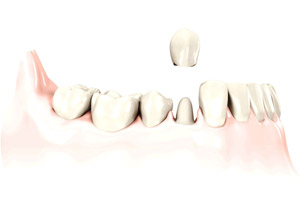 Crown on a natural tooth
Crown on a natural tooth
If a tooth is damaged (for whatever reason), but the root remains intact, a dentist can simply place a crown over what remains of the tooth and root (sometimes, root canal therapy may also be necessary to save the tooth root to allow it to be able to support a crown.
Adjacent teeth are not compromised in any way, and the crown should look indistinguishable from your other natural teeth. No one will know that you have had a damaged tooth.
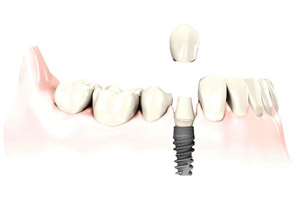 Crown on an implant
Crown on an implant
If you are completely missing just one tooth, an all-ceramic dental crown on a single dental implant is often the best choice. The implant serves as a foundation for the crown, taking the place of the natural tooth root. You will not feel any difference between the implant and your normal teeth.
The crown is then attached to the dental implant, and will match the shape and contour or your natural teeth, so that no one can tell the difference. The adjacent teeth are not compromised in any way, and you will not suffer continuing bone loss that would otherwise weaken neighbouring teeth.
For Two or More Missing Teeth
How does a normal dental bridge differ from an implant bridge?
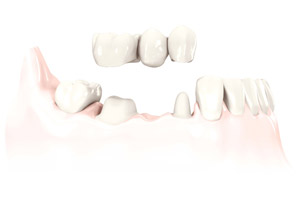 Bridge on natural teeth
Bridge on natural teeth
A bridge is an economically viable, long-term solution for one or more missing teeth. The bridge is supported by adjacent natural teeth, which must be prepared beforehand to serve as a support for the new bridge. Whilst economically viable, the disadvantage to this method, is that often, the adjacent teeth may be perfectly normal and healthy, but in the preparation, they must be ground down in order to prepare them for the bridge that will eventually help hold everything in place to fill the gap of the missing tooth or teeth. Another disadvantage is that bone loss, whilst slowed down, cannot be altogether prevented.
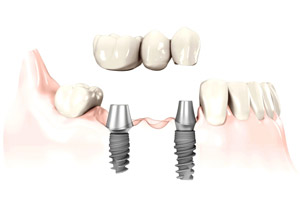 Bridge on implant
Bridge on implant
A bridge supported by implants counteracts any potential bone loss and protects the adjacent healthy teeth. The teeth immediately adjacent are not damaged in any way. A bridge firmly anchored to implants provides an aesthetically pleasing, fully functional result that helps prevent further bone loss.
When Many or All Teeth are Missing
Missing all of your teeth can have a devastating effect on your quality of life. As well, it often makes people look and feel older. The conventional and cheapest solution is a denture or partial denture. Anyone with dentures will be able to tell you that it is uncomfortable and that your eating habits will change (softer, often over-cooked foods are preferred). As a result, your nutrition and digestion will be affected, as eating crunchy vegetables and fruits, and seeds and nuts are almost impossible to eat. Also, with an upper denture you can expect a loss of sense of taste. Worst of all, bone loss will also likely progress and with it, you will have diminished functionality. This is when patients are likely to complain that they are fearful they will lose their dentures if they smile too broadly, laugh or even just in speaking – there is limited bone left to hold the denture in place.
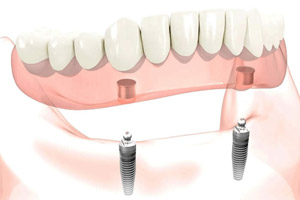 Removable Bridge on Implants
Removable Bridge on Implants
Here, a denture-like structure is firmly secured on two or more implants, using mechanical anchors.
After placement, the implant supported prosthesis largely functions and appears just like natural teeth. The sense of taste is preserved, as taste buds are not covered as they are with a full denture.
In this way, the prosthetic is more like a bridge. This bridge can be easily removed for cleaning. Taste sensation is unaffected and the need for denture adhesives is eliminated.
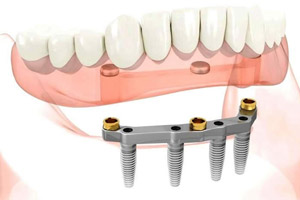 Removable Bridge on Implant Bar
Removable Bridge on Implant Bar
For an even more secure fit, an implant bar is fixed to your jaw and is supported by two or more implants. The bar serves as a more rigid supporting element for a removable prosthesis. The prosthetic can be removed for easy cleaning and again, sense of taste is retained, whilst the need for denture adhesives is eliminated.
Fixed Implant Supported Bridge
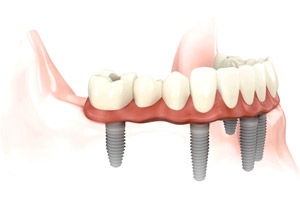 Here, a prosthesis is supported by four (All-on-4™) or more implants. It is a more durable solution. The prosthesis is fixed firmly in place and the gums remain free.
Here, a prosthesis is supported by four (All-on-4™) or more implants. It is a more durable solution. The prosthesis is fixed firmly in place and the gums remain free.
Taste sensation is therefore maintained, and there is no need for denture adhesives. The main advantage is that this solution stimulates bone maintenance, and restores chewing function.
Please note that any surgical or invasive procedure carries risks. Before proceeding, you should seek a second opinion from an appropriately qualified health practitioner.



